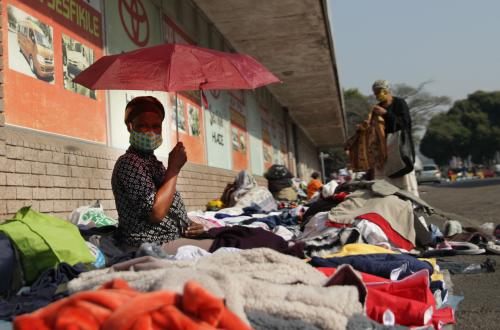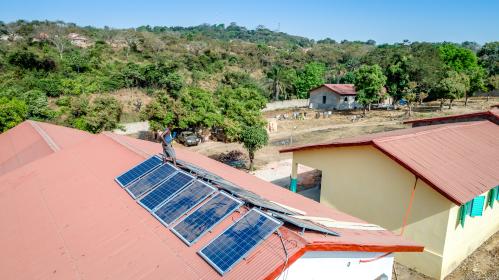Incumbent President Nana Akufo-Addo declared winner of Ghanaian elections
On Wednesday, December 9, Ghana’s incumbent president Nana Akufo-Addo won a second term in office, winning 51.59 percent of the vote in general elections that took place on Monday. Opposition leader and former president, John Mahama, who has twice before lost to Akufo-Addo, won 47.36 percent of the vote. Votes were also cast for the country’s 275 parliamentary seats; results have not yet been announced but are expected to be very close. Overall, more than 13 million votes were cast, with a voter turnout rate of over 75 percent.
Mahama has not yet conceded defeat and has rejected the electoral results, citing alleged irregularities and accusing Akufo-Addo of harnessing the military in an attempt to sway the outcome. Election observers, however, stated that the polling was generally free and fair; a representative from Ghana’s independent and nonpartisan Coalition of Domestic Election Observers stated that “the results declared by the electoral commission reflect how Ghanaians voted in the presidential election polls.” Although the election was generally peaceful—a regular occurrence for Ghana’s stable democracy—five people were reported to have been killed in election violence, and the Ghanaian Police Service recorded 60 incidents during Monday’s vote, 21 of which it said were “true cases of electoral violence.”
American troops ordered to leave Somalia; US recognizes Moroccan sovereignty over Western Sahara
Late last week, the United States announced it would be pulling the majority of its 700 troops from Somalia, stating that the al-Shabaab threat, while present, is “contained.” The recent announcement follows similar U.S. military drawdowns in Afghanistan and Iraq. Notably, the U.S. will not be leaving the country entirely: Chairman of the Joint Chiefs of Staff General Mark Milley stated that the continued presence would be “a relatively small footprint, relatively low cost in terms of number of personnel and in terms of money” as the U.S. will still be working to fully eliminate the threat of extremist groups like al-Shabaab. The head of U.S. Africa Command (AFRICOM), General Stephen Townsend, emphasized on Thursday that “U.S. forces will remain in the region and our tasks and commitment to partners remain unchanged.” Somali leaders have referred to the drawdown as “extremely regrettable” given the support the U.S. has provided for training and operational effectiveness in recent years. Indeed, on Thursday, December 10, the U.S. launched two airstrikes in which eight al-Shabaab fighters were killed.
Also on Thursday, the U.S. officially recognized Moroccan sovereignty over the disputed territory of Western Sahara after 40 years of official neutrality as part of a wider U.S.-brokered deal between Israel and Morocco. As part of that deal, Morocco became the fourth Arab-majority country in recent months to agree to normalize diplomatic relations with Israel. While many celebrated the overall agreement, the Western Sahara announcement was met with criticism from members of U.S. President Donald Trump’s own party, as Republican Chairman of the Senate Armed Services Committee James M. Inhofe stated, “He could have made this deal without trading away the rights of this voiceless people.”
The decadeslong ceasefire between Morocco and Western Sahara ended in early November with a military incursion from Morocco into the United Nations-controlled buffer zone in response to what Morocco called “provocations” by the Western Saharan pro-independence group Polisario Front. The Polisario Front called the U.S. decision “a flagrant violation” of the United Nations charter and international law and said that the “Sahrawi people will continue their legitimate struggle by all means to defend their sovereignty.”
East Africa trade update
On December 3, the East African Community (EAC) submitted its tariff offer for trade under the African Continental Free Trade Area (AfCFTA) to the African Union Commission, two days ahead of the deadline. The EAC’s submission of their tariff offer means that every Customs Union and Single Customs Territory has now submitted a tariff offer for trade under the AfCFTA, with the Economic Community of West African States also submitting their offer on December 2. Forty countries are now prepared to participate in the AfCFTA on January 1, 2021 when trading under the agreement is scheduled to begin.
East African trade has, however, faced recent challenges, with the Uganda Manufacturers Association (UMA)—an umbrella group of Ugandan industrialists and manufacturers—accusing Kenya of unfairly blocking Ugandan products, including milk, sugar, and poultry and beef products, from its market. Kenya has not yet responded to the accusations that Kenya has baselessly claimed that Ugandan products, including those with valid certificates of origin, are counterfeit. The UMA has also expressed frustration with the Ugandan government’s “inability to decisively resolve the unfair trade practices subjected to Uganda by Kenya.” If the dispute is not resolved, the UMA has threatened to bar Kenyan goods from entering Uganda and seek redress at the East African Court of Justice.





Commentary
Africa in the news: Elections in Ghana, US relations with Somalia and Morocco, and trade in East Africa
December 12, 2020